SustainabilitySUSTAINABILITY
Environment
Under our corporate philosophy of "Everything we do is for our customers," the Kaga Electronics Group seeks to meet our customers' needs while striving for the realization of a sustainable society. To achieve this goal, we are committed to conserving and enhancing the natural environment in order to protect our irreplaceable earth.
- 1
- The Kaga Electronics Group shall establish an environmental management system involving all executives and employees (including contract and temporary employees. The same applies hereinafter in this environmental policy). Under this management system, we shall promote global environmental conservation and pollution prevention in all business activities, including the provision of products and services.
- 2
- In executing our business activities, we shall strictly adhere to environmental laws, regulations, and requirements as well as comply with all other requirements agreed upon by the Kaga Electronics Group.
- 3
- We shall reduce CO2 emissions, promote the use of renewable energy, and thoroughly implement energy and resource conservation initiatives through our business activities to mitigate climate change.
- 4
- Products and services handled by the Kaga Electronics Group shall, to the extent possible, meet the following requirements.
・Must be comprised of environmentally friendly substances
・Must be able to cut waste through reuse and recycling
・Must be designed with energy and resource conservation in mind using the latest electronics technology
- 5
- We shall raise awareness among our executives and employees regarding environmental and biodiversity conservation, and promote education and training to implement our environmental policy.
- 6
- Our Environmental Policy shall be disseminated widely throughout society through such means as the Kaga Electronics Group website and integrated report.
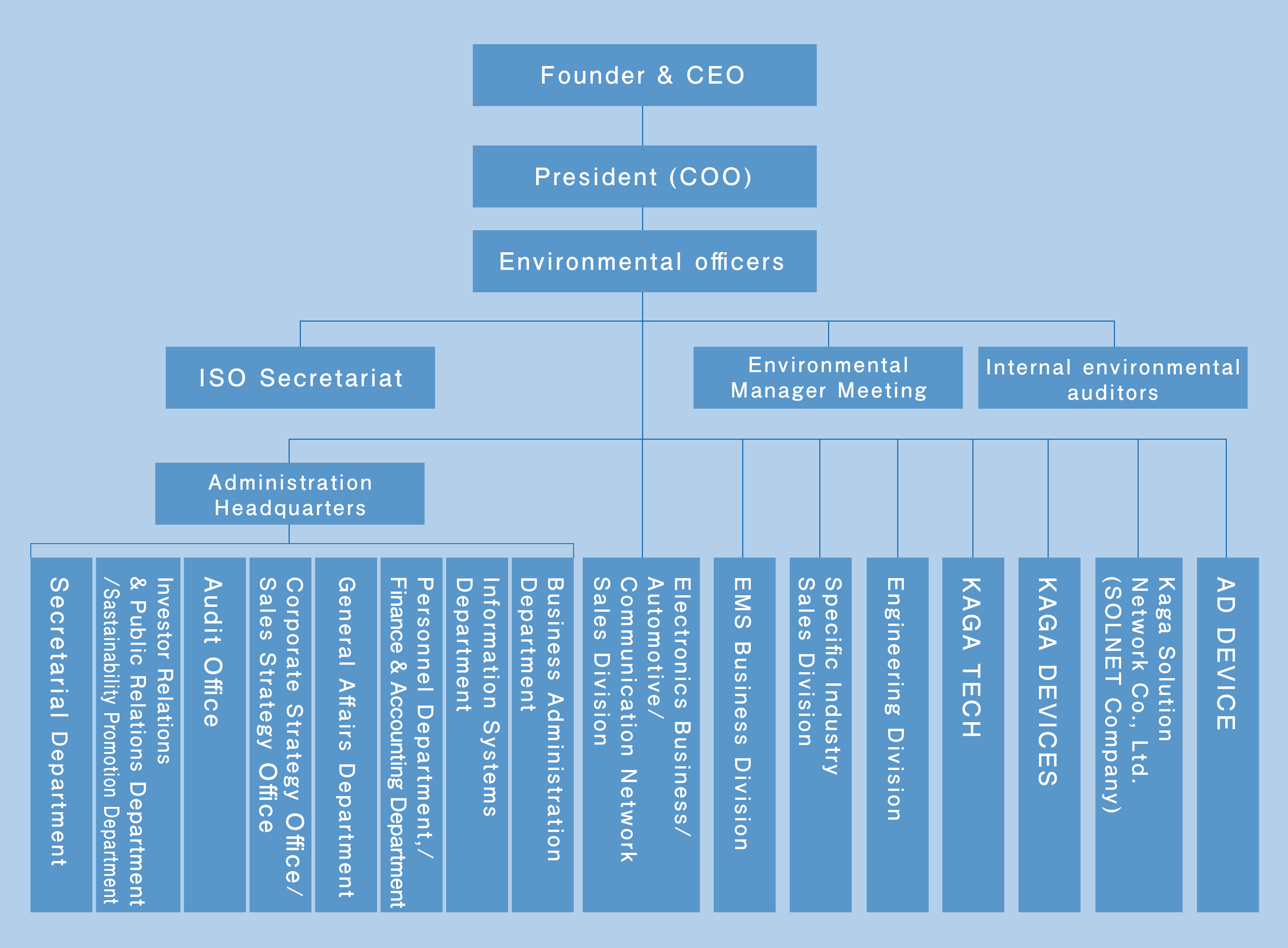
The Kaga Electronics Group considers the promotion of CSR and sustainability as its key management issues and has formulated a Medium- to Long-Term Sustainability Management Plan in 2021. In particular, we are currently advancing our contribution to the global environment by reducing CO2 emissions and promoting waste reduction and reuse through our business activities, and offering environmentally friendly products and services. Furthermore, we have set “creating a clean global environment” as one of our material issues and are working to address climate change, and we recognize significant transition risks, physical risks, and opportunities in accordance with the TCFD recommendations framework. Our implementation policies are as follows.
Status of Implementation of TCFD Recommendations
Governance
The Group established the Sustainability Committee by integrating and consolidating the former CSR Committee and SDGs Committee in April 2024 to enhance the Group’s overall corporate value through the implementation of cross-group initiatives that address medium- to long-term management issues related to the environment, society, governance, and other areas. Under this committee, we have established six specialized subcommittees, including the Environmental Management Promotion Committee and the Risk Management Committee.
The committee meetings are held once every six months, in principle, and the committee is composed of the President and COO as the Chairperson, executive officers overseeing each division as committee members, and the Sustainability Promotion Department serving as the secretariat. The secretariat is responsible for the collection, disclosure, and reporting of information related to the Group’s sustainability promotion activities, as well as other activities that support the operation of the committee for facilitating the holding of committee meetings in collaboration with each specialized subcommittee.
The roles of the committee include the deliberation of sustainability-related issues identified by specialized subcommittees such as the Environmental Management Promotion Committee, the formulation of strategies and targets and the implementation of measures for the Group's ESG issues, including those related to climate change, and the monitoring of their progress.
The matters considered and resolved by the Sustainability Committee are reported to the Board of Directors each time. The Board of Directors then consults with the committee on the matters reported and provides instruction and oversight on the initiatives implemented by the committee.
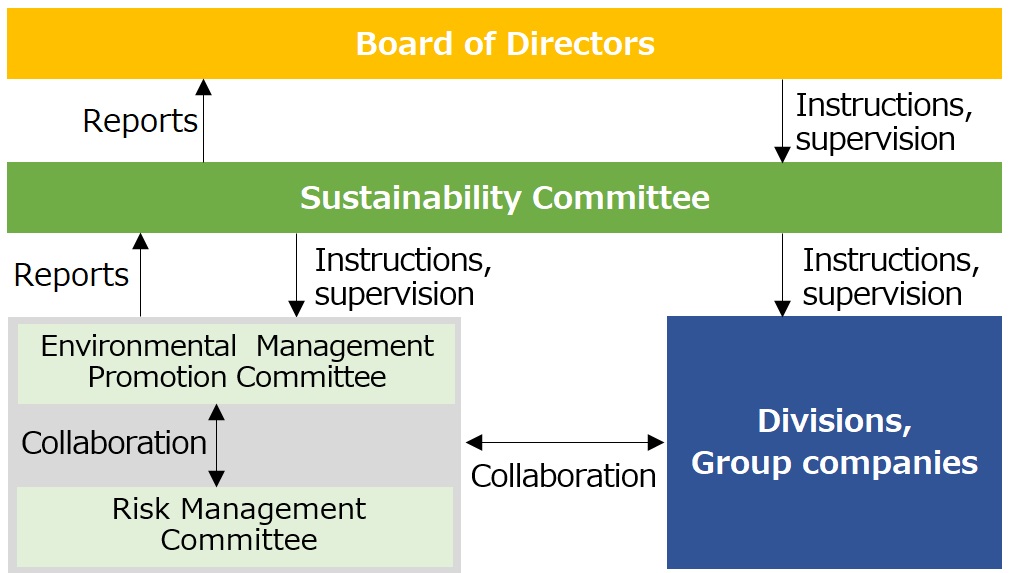
Strategy
Analysis process
We examined the risks and opportunities posed by climate change regarding the Group’s business operations in the following steps, with reference to the items of risks and opportunities presented in the TCFD recommendations.
Moreover, we conducted an analysis of the transition of policies and market trends (transition risks and opportunities) and an analysis of physical changes due to disasters and other factors (physical risks and opportunities), using two scenarios, a 1.5°C scenario and a 4°C scenario.

Climate change scenarios
A scenario that aims to limit the increase in global surface temperature to less than 1.5°C compared to pre-industrial levels, by accelerating initiatives aimed at achieving carbon neutrality to mitigate the impacts of climate change. In the 1.5°C scenario, it is assumed that the impact of policy and legal risks among transition risks will be greater, compared to the assumptions regarding those risks in the 2°C scenario.
A scenario in which measures against climate change do not progress from the current state, resulting in a global surface temperature rise of approximately 4°C by the end of this century compared to pre-industrial levels. It is assumed that the impacts of intensifying extreme weather events and sea level rise on physical risks will increase.
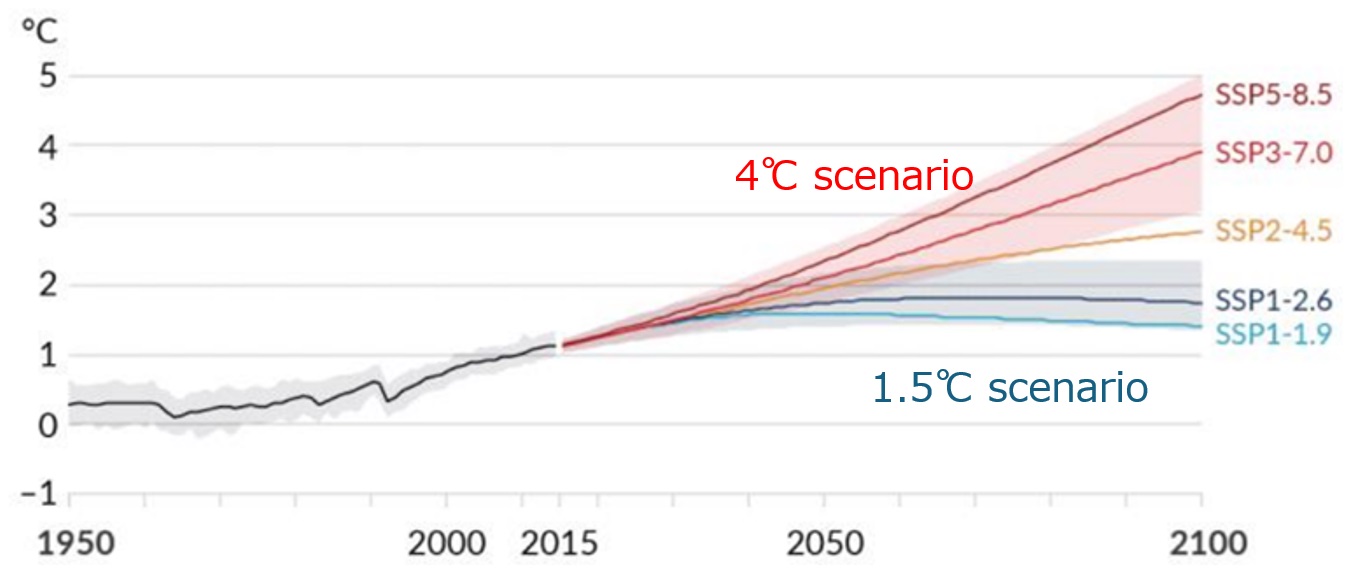
Source:
This figure is a reproduction of Figure SPM.8 from the Summary for Policymakers of the Working Group I (WGI) contribution to the Intergovernmental Panel on Climate Change (IPCC) Sixth Assessment Report (Ministry of Education, Culture, Sports, Science and Technology and Japan Meteorological Agency)
Impact assessment of risks and opportunities and selection of countermeasures
In the 1.5°C scenario, it is expected that the decarbonization of fuels and raw materials will advance due to intensifying external pressures for decarbonization, leading to a rise in procurement costs and costs associated with compliance with emissions regulations. On the other hand, customers will increasingly demand energy-saving and low-carbon products, so we expect to see growing demand for existing businesses, such as the reuse and recycling of power semiconductors and information devices that contribute to energy efficiency, as well as the acquisition of new business opportunities through the implementation of emission reduction measures.
In the 4°C scenario, low-carbonization and decarbonization initiatives are expected to be promoted; however, their effects will be limited, leading to rising trends in CO2 emissions. This situation is likely to result in an increase in extreme weather events and disaster risks. Consequently, incidents such as damage to manufacturing sites and disruptions in the supply chain are anticipated, making it necessary to strengthen Business Continuity Planning (BCP) measures, including those involving external partners.
We are aware of the major transition risks and physical risks and earnings opportunities relating to climate change as follows.
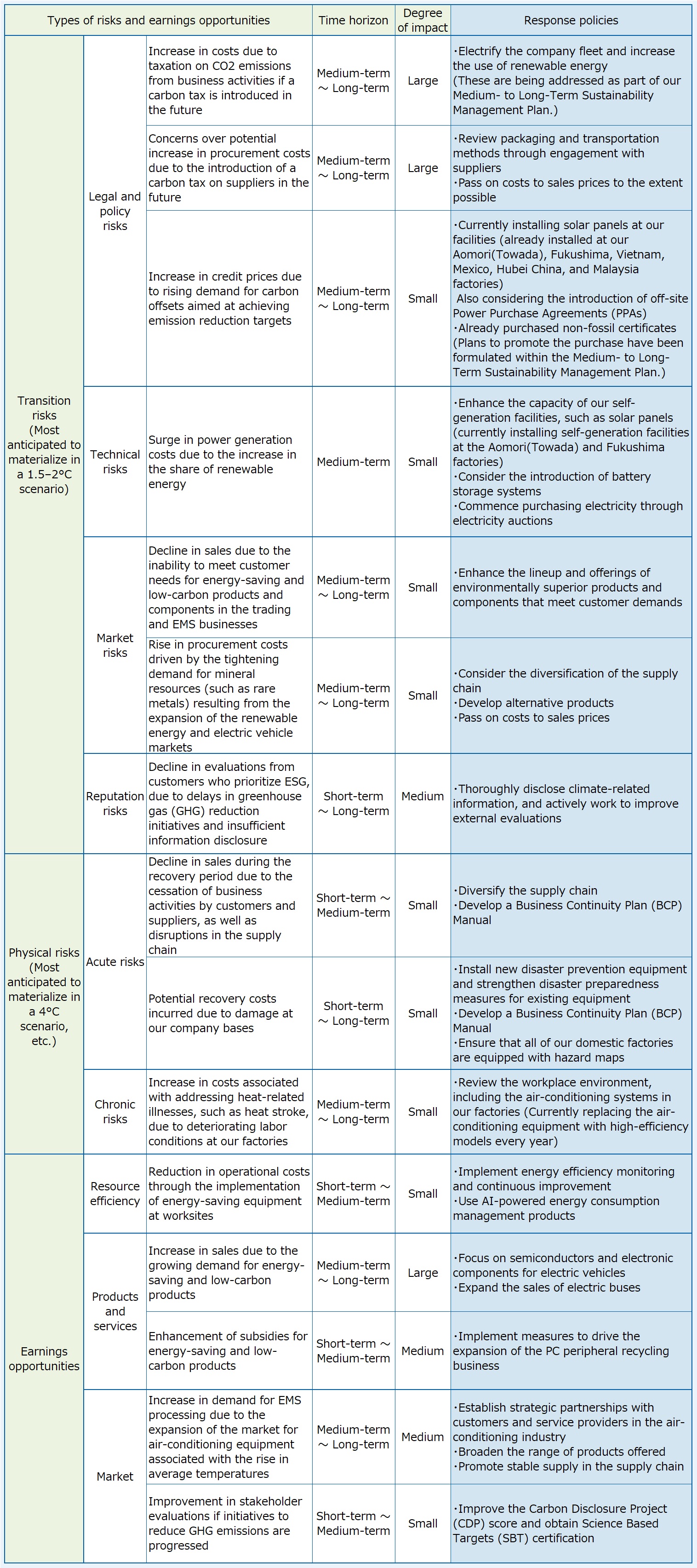
・Time horizon:Short-term: up to 3 years, Medium-term: 3 to 6 years (2030), Long-term: 6 to 26 years (2050)
・Degree of impact:Large: 10% or more of operating income, Medium: 3% to 10% of operating income, Small: Less than 3% of operating income
Risk management
Process for classifying, evaluating, and managing climate-related risks
We have established the Environmental Management Promotion Committee as a specialized subcommittee directly under the Sustainability Committee. Each department and group company identifies short-term and medium- to long-term risks associated with climate change. The Environmental Management Promotion Committee then classifies and evaluates these risks, and reports the particularly significant ones to the Board of Directors through the Sustainability Committee every six months.
With regard to the classified and evaluated climate change-related risks, the Environmental Management Promotion Committee considers preventive measures and response policies. After deliberation and decision by the Sustainability Committee, these measures and policies are implemented by each department and group company. Furthermore, we comprehensively evaluate the importance and prioritization of risks from the perspectives of impact and urgency. The Sustainability Committee also reports on these matters to the Board of Directors in a timely and appropriate manner.
Integration process into Group-wide risk management
The Risk Management Committee overseeing Group-wide risks has been established as a specialized subcommittee directly under the Sustainability Committee. It designates a department to address each specific risk, and under the direction of the department's risk control officers and managers, a necessary and appropriate risk management framework is established. With regard to climate change-related risks, the Environmental Management Promotion Committee and the Risk Management Committee are working in collaboration to establish an integrated Group-wide risk management system.
Metrics and targets
The Group has calculated Scope 1, 2, and 3 emissions for the fiscal year ended March 31, 2024. As a result, we have set a reduction target of 42% for Scopes 1 and 2 and 25% for Scope 3 by 2030, based on the fiscal year ended March 31, 2024.
The Group is committed to understanding the current situation and working toward achieving its goals.

The Group has established the Medium- to Long-Term Sustainability Management Plan (announced on November 25, 2021) and is targeting the “achievement to shift to 100% renewable energy” and “shift to electricity for company-owned vehicles” to address environmental issues relating to the reduction of GHG emissions. The medium- and long-term targets for the main KPIs and progress in FY2023 are shown below.
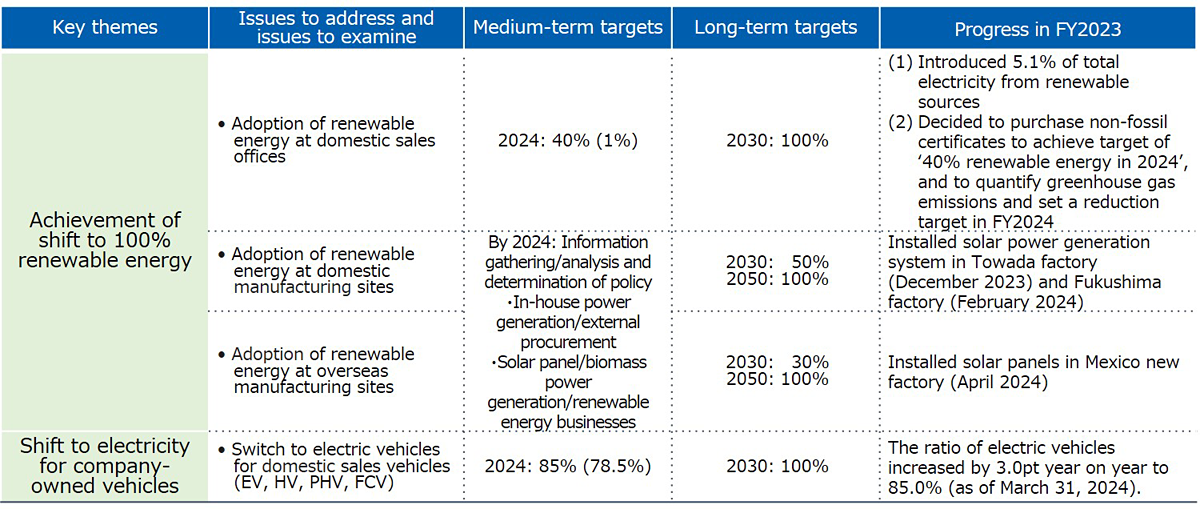
* Click here (ESG Data) for detailed data on Scope 1 to 3 emissions.
* Click here for the Medium- to Long-Term Sustainability Management Plan.
Although the Company has historically calculated greenhouse gas emissions only for specific sites, from the perspective of continuous emissions management and transparent information disclosure, we have calculated Scope 1, 2, and 3 emissions for the fiscal year ended March 31, 2024. As a result, we have set a reduction target of 42% for Scopes 1 and 2 and 25% for Scope 3 by 2030, based on the fiscal year ended March 31, 2024.
The Group is committed to understanding the current situation and working toward achieving its goals.
Emissions for the year ended March 31, 2025 are as follows
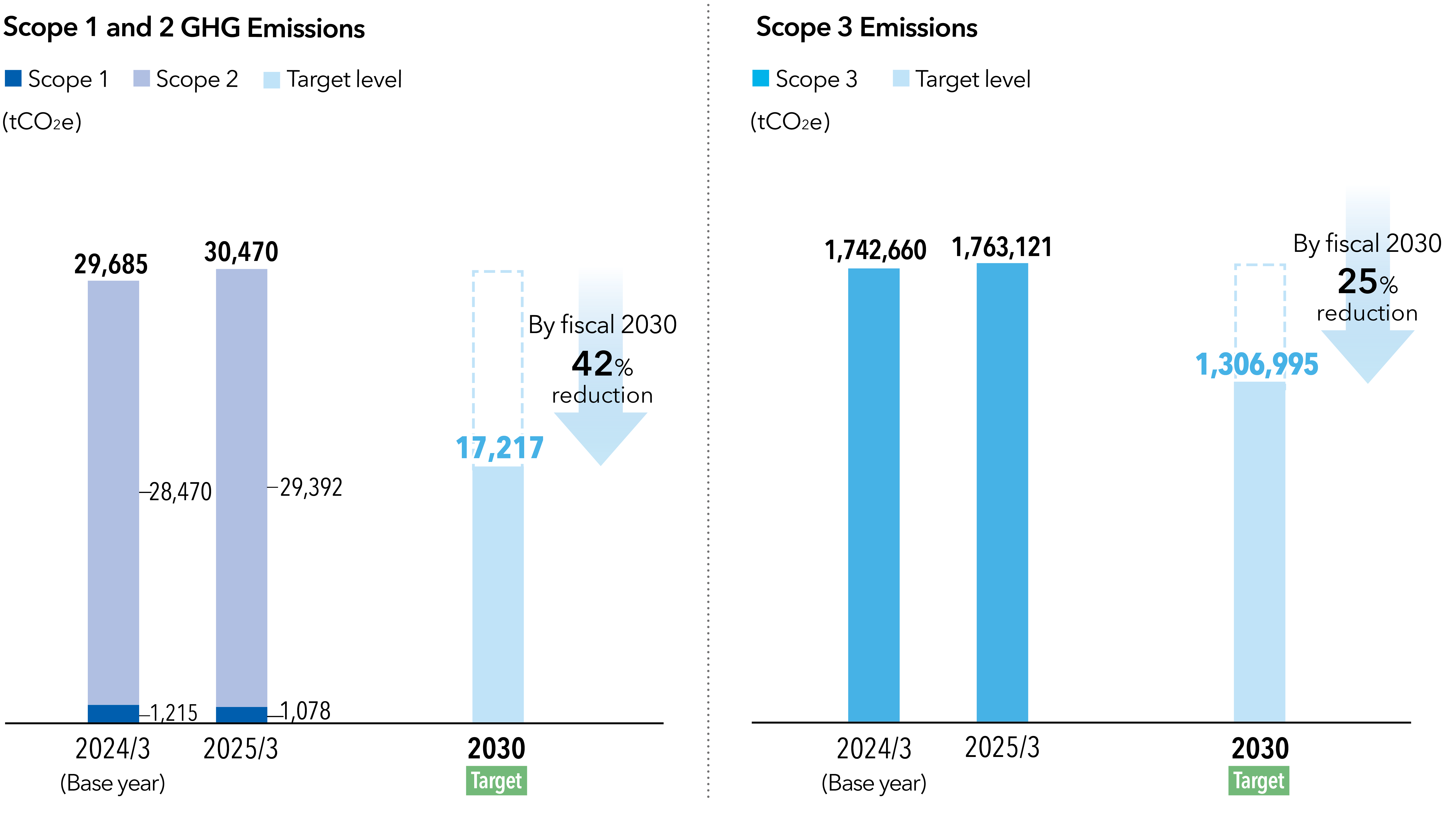
* Click here (ESG Data) for detailed data on Scope 1 to 3 emissions.
Reduction of CO2 emissions
The KAGA ELECTRONICS Head Office building employs an air supply type double-skin* curtain wall on the exterior,allowing air to flow into the office, thus reducing heat load and providing natural ventilation. The energy efficient design also enhances sound insulation.
In addition, the building features a variety of environmental technologies, with the use of solar panels on the roof enabling eco energy and the installation of LED lighting throughout. These technologies serve to save energy and reduce CO2 emissions.
* Double-skin technology refers to a method of construction in which part or all of a building exterior is covered in glass.
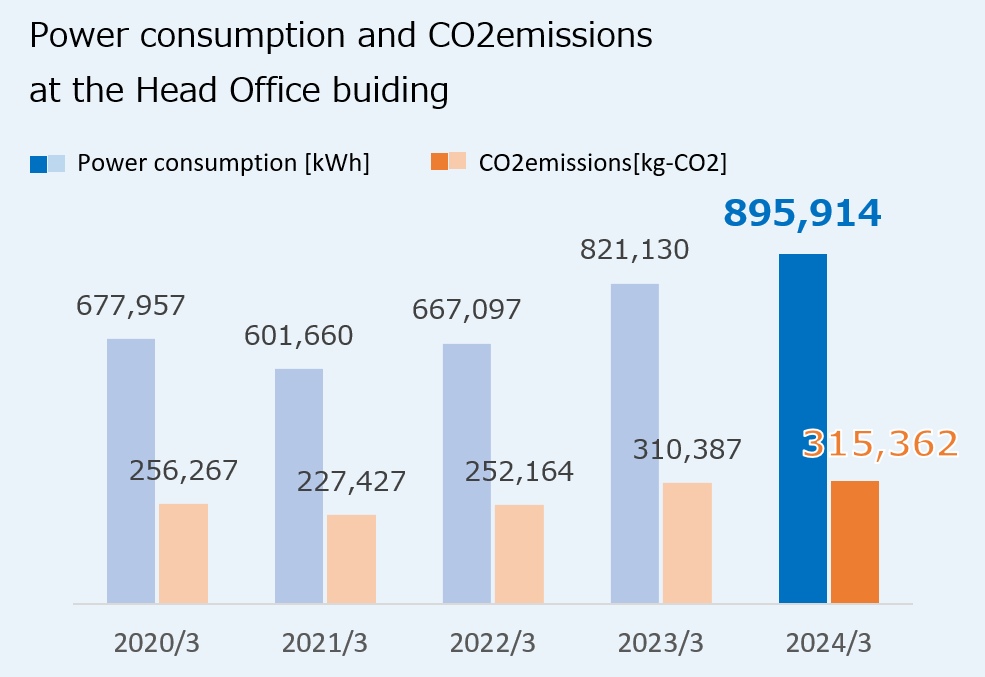
The Group has installed renewable energy facilities employing solar panels at manufacturing sites in Aomori and Fukushima prefectures in Japan as well as at overseas manufacturing sites in China, Vietnam, and Mexico. Most of these installations account for several dozen percent of their respective facility’s annual electricity consumption, with the largest plant in Vietnam expected to cover more than 70% of its electricity needs.
We will continue our efforts to achieve 100% renewable energy by installing more solar panels and storage batteries, as well as making other environmental
considerations.
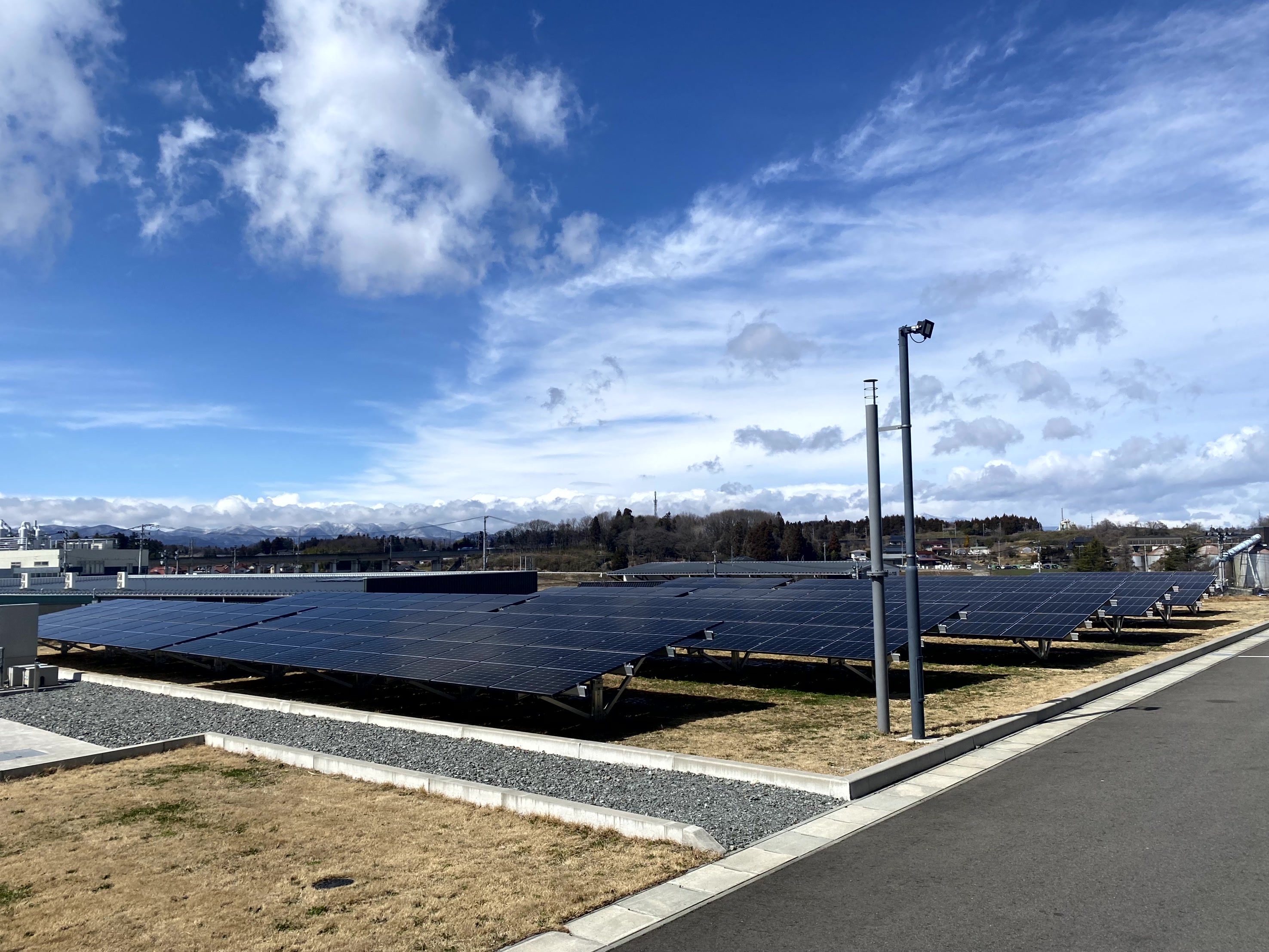
Fukushima Site 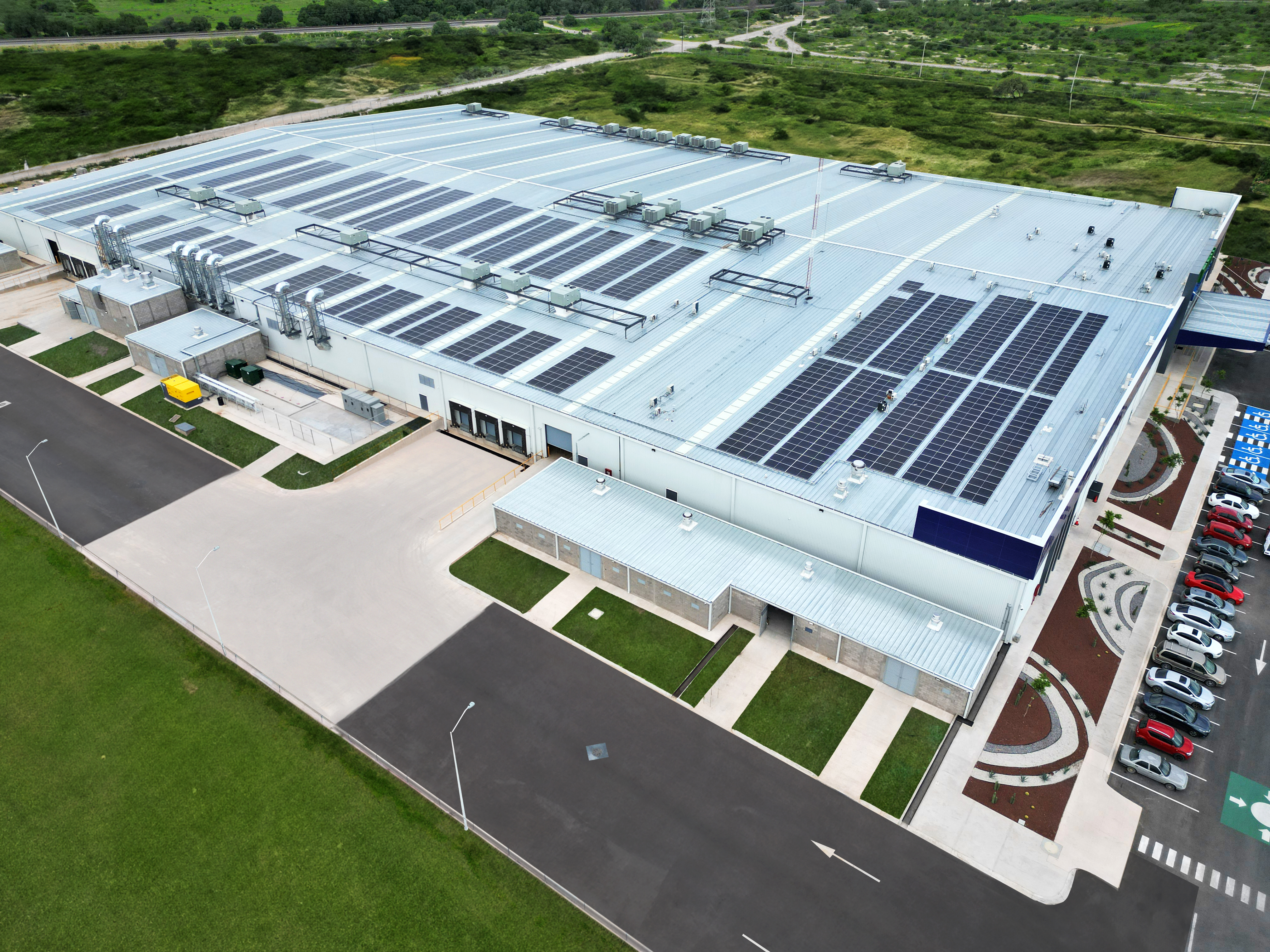
TAXAN MEXICO’s New Plant 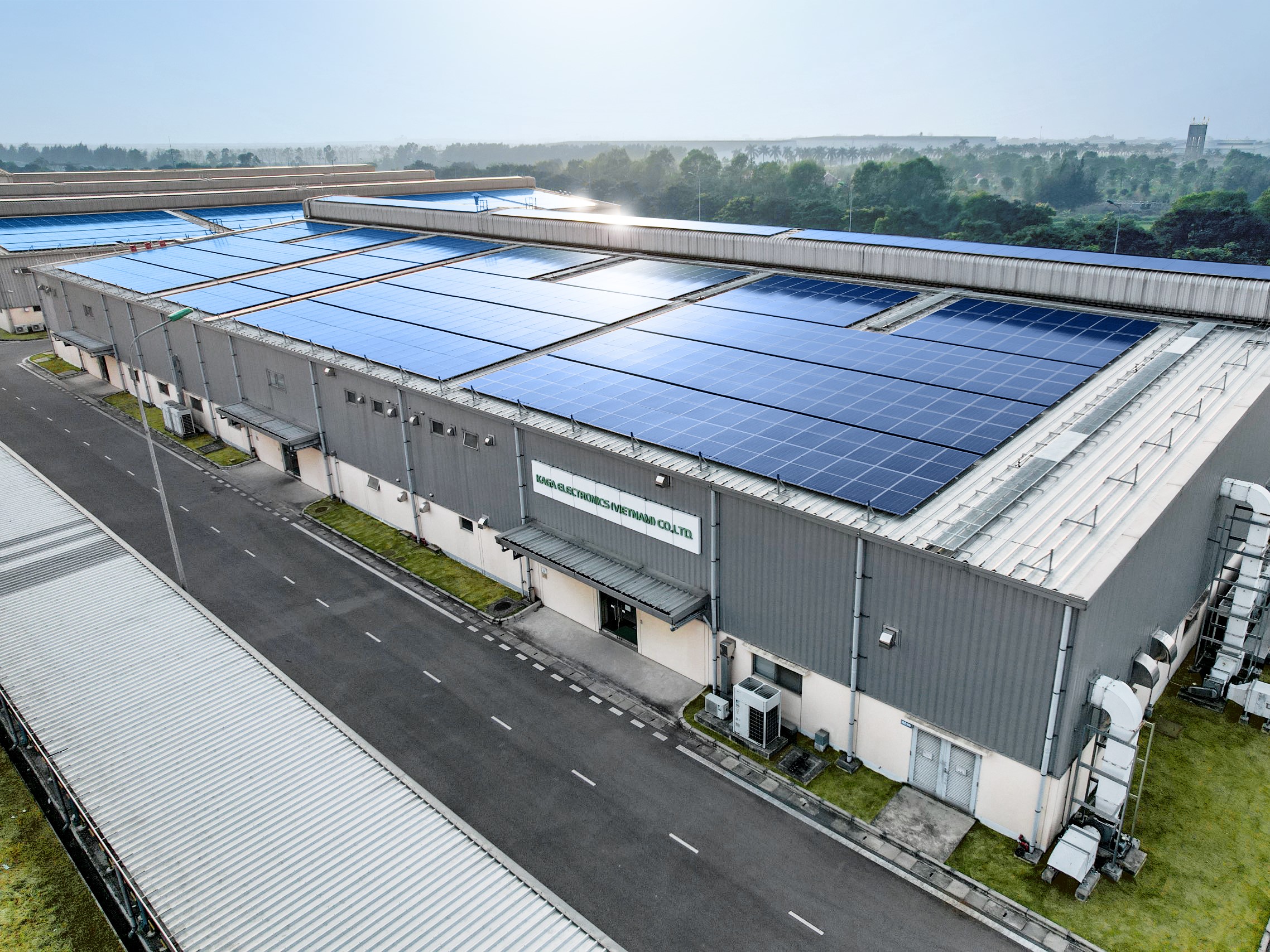
Vietnam factory
PC product reuse and recycling business
The Kaga Electronics Group company KAGA MICRO SOLUTION CO., LTD. has flexibly changed and expanded its business domain to meet a wide range of customer demands, from the development, production and sale of electronic products to their repair, maintenance, reuse and recycling.
The company has leveraged know-how in the production of electronic equipment and an extensive procurement route for electronic parts and materials—both of which were accumulated in the EMS business, a strength of the Group—to focus on a reuse and recycling business for PC products in recent years.
In addition to “reduce programs” that look especially at cutting CO2 and rubbish levels, the Group will contribute to a reduction in environmental burden from a reuse and recycling perspective and to the realization of a recycling-oriented society.
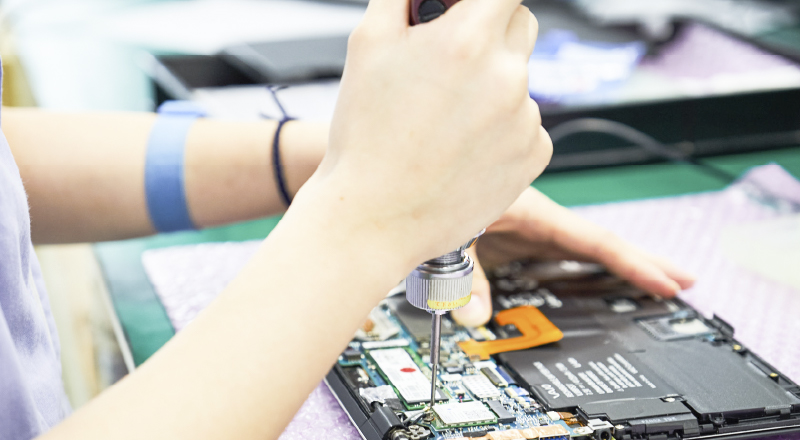
Repair work at KAGA MICRO SOLUTION
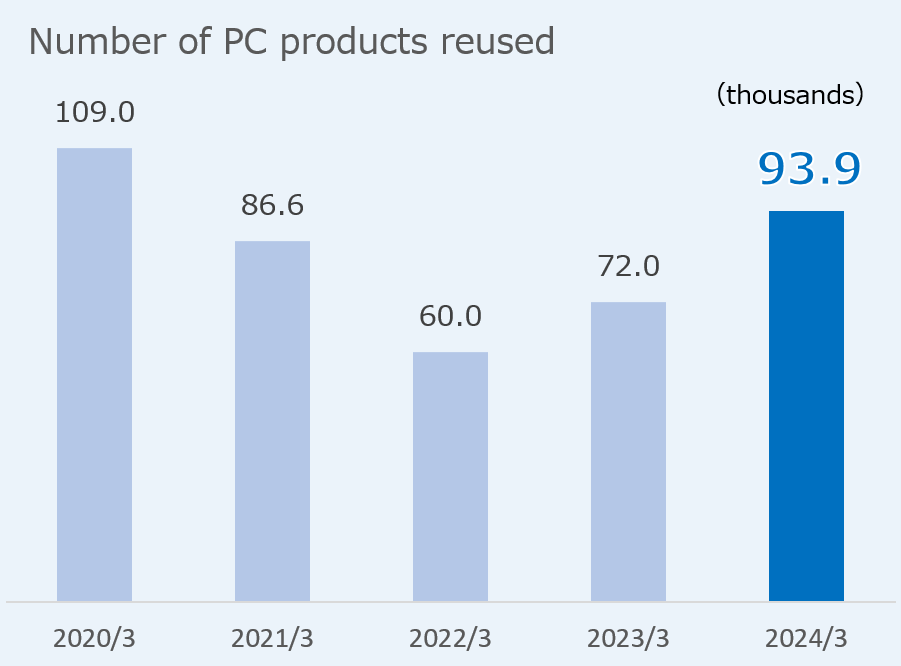
– Biotope set up at the Kaga Electronics head office –
In 2023, the Company installed a biotope type rooftop garden at its Head Office building in line with its commitment to preserving biodiversity and protecting the natural environment. To this end, we also strive toward species conservation and the creation of environments conducive to the survival of living organisms and plants. Furthermore, we regularly host biodiversity lectures for employees and their families, inviting representatives from cooperating NPOs to serve as instructors.
We will continue to regularly survey the habitats of living organisms and plants and provide information through the Company’s website.
Features of the biotope
The rooftop garden at the head office, which is one way we have enhanced the workplace environment for employees, sets the scene for meals, breaks, and casual employee get-togethers. A recent addition is the 3×4 meter pond built in a corner, which serves as a biotope habitat for the creatures that now live there. The pond has four zones at depths of 2 cm, 6 cm, 12 cm, and 18 cm, and a variety of environments have been arranged – for shallow-water flora and fauna, for example – so that diverse wildlife can thrive here. As soil for the plants that play a key role in the biotope, approval was obtained from the ward office to use earth from the Arakawa riverbed. This recreates the Arakawa watershed environment in the Kandamatsunagacho area where the head office is located. We were pleased to find that valuable plants have germinated from seeds buried in the soil. The head office building lies about 2 kilometers from the lush Imperial Palace, and local insects and other wildlife are expected to fly here. In this way, we anticipate the Group biotope becoming a satellite habitat that will expand the range where these creatures are active. Insects and other creatures will find a broader breeding area. As for fish and other aquatic life here, the fact that there is limited public access to this company biotope eliminates the risk of introducing non-native species. We are taking advantage of this to create an optimal habitat for native species.
Before the biotope was set up
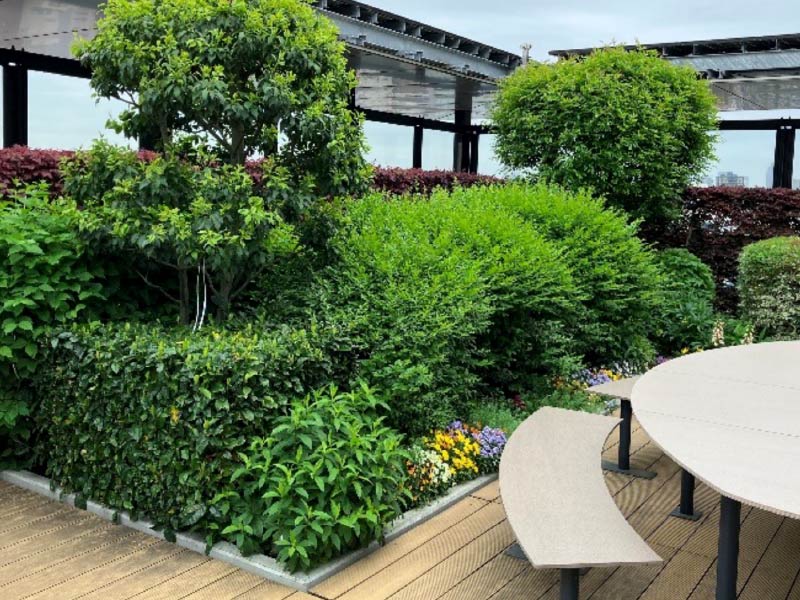
Biotope garden
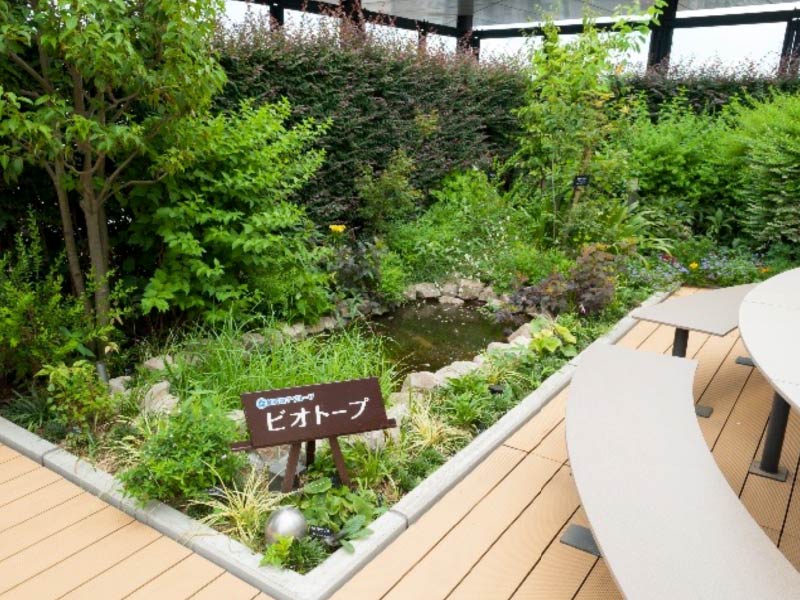
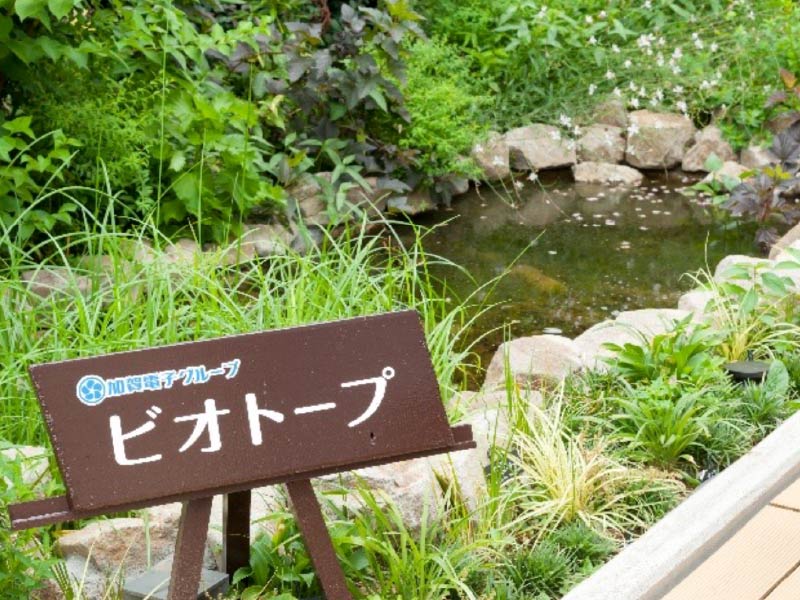
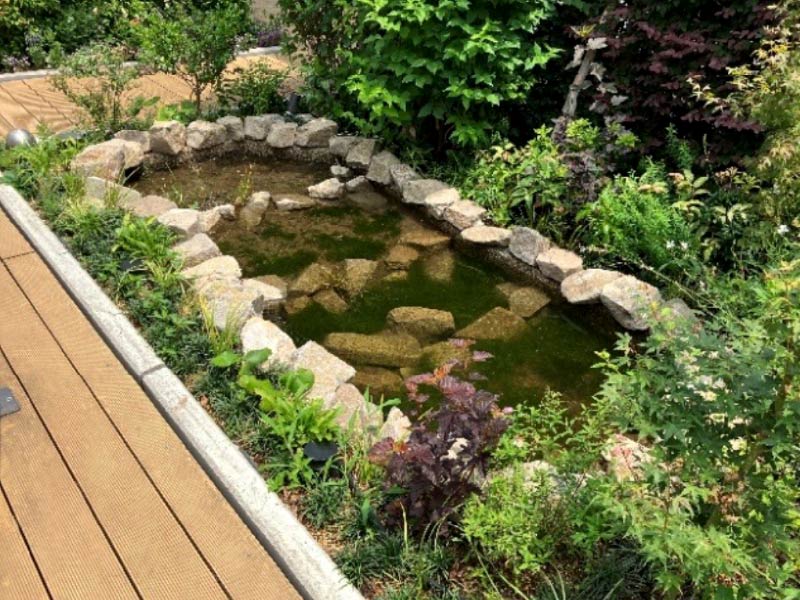
The Group conducts regular surveys of wildlife in the biotope roughly three times a year in the spring, summer, and fall. Results are posted online as described below. Besides research activities, biotope workshops are also held. Employees attend these events with their children and other family members, which provides opportunities to have fun interacting with nature. Through these kinds of initiatives, the Group hopes to kindle an interest in the natural environment and ecosystems among employees and their families. Maintaining ecosystems will remain a commitment of the Group as a whole.